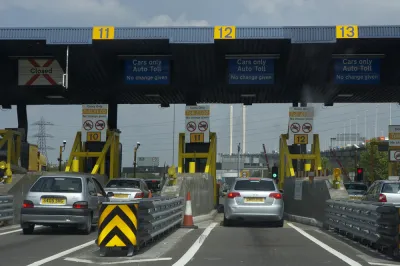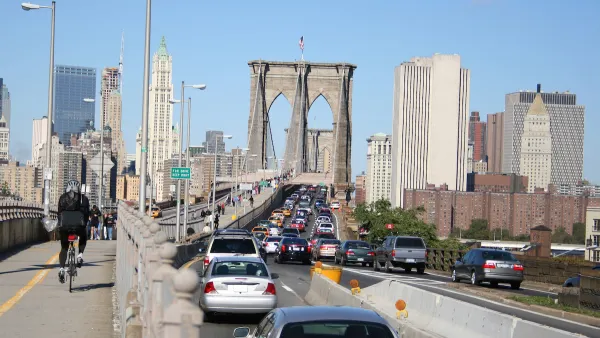A timely debate, as New York City debates a congestion pricing scheme proposed by Gov. Andrew Cuomo, and California looks for ways to reduce emissions from transportation.

Michael Manville tackles the big, politically challenging problem of congestion pricing. Of particular concern is the typical congestion pricing opposition argument of its impact on populations living in poverty.
Before debating the question of whether tolls are fair, Manville explains congestion pricing and also cites examples of the success of congestion pricing schemes in London, Stockholm, Milan, and Singapore. If you're looking for a clear, concise explanation of the concepts behind congestion pricing, the beginning of Manville's article is a good place to start.
Then, Manville turns to the polemic, and the question of congestion pricing's fairness to people dealing with poverty.
…Tolls would be regressive — their burden is larger for lower-income people. On the other hand, not all low-income people drive. The poorest people generally can’t afford cars, so tolls would not hurt the most vulnerable — and might even help them (if reduced traffic congestion let buses travel faster).
That said, many low-income people do drive, and tolls may burden them. Fortunately, tolls also come with a built-in solution to this problem: revenue. Toll revenue can offset costs for low-income drivers…
More compelling arguments to refute the idea that congestion pricing can't be fair, and also that the status quo is fair at all, conclude the article. For the real world situations where large population centers are considering measures to mitigate congestion and its negative environmental and economic outcomes, see the debate over Governor Andrew Cuomo's congestion pricing proposal for New York City, and a discussion of California's elephant in the room of climate change: emissions from cars.
FULL STORY: Is congestion pricing fair to the poor?

Analysis: Cybertruck Fatality Rate Far Exceeds That of Ford Pinto
The Tesla Cybertruck was recalled seven times last year.

National Parks Layoffs Will Cause Communities to Lose Billions
Thousands of essential park workers were laid off this week, just before the busy spring break season.

Retro-silient?: America’s First “Eco-burb,” The Woodlands Turns 50
A master-planned community north of Houston offers lessons on green infrastructure and resilient design, but falls short of its founder’s lofty affordability and walkability goals.

Test News Post 1
This is a summary

Analysis: Cybertruck Fatality Rate Far Exceeds That of Ford Pinto
The Tesla Cybertruck was recalled seven times last year.

Test News Headline 46
Test for the image on the front page.
Urban Design for Planners 1: Software Tools
This six-course series explores essential urban design concepts using open source software and equips planners with the tools they need to participate fully in the urban design process.
Planning for Universal Design
Learn the tools for implementing Universal Design in planning regulations.
EMC Planning Group, Inc.
Planetizen
Planetizen
Mpact (formerly Rail~Volution)
Great Falls Development Authority, Inc.
HUDs Office of Policy Development and Research
NYU Wagner Graduate School of Public Service




























